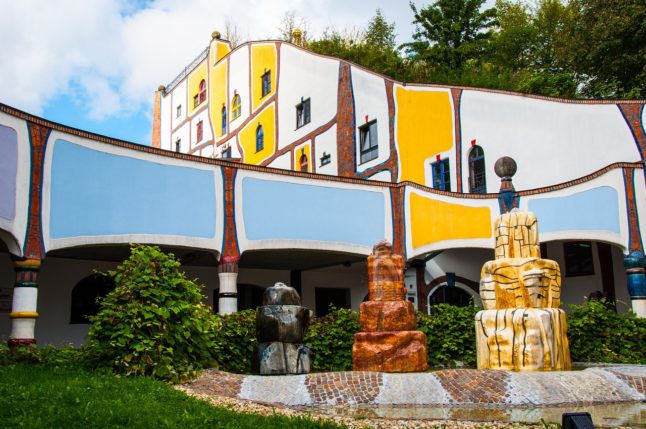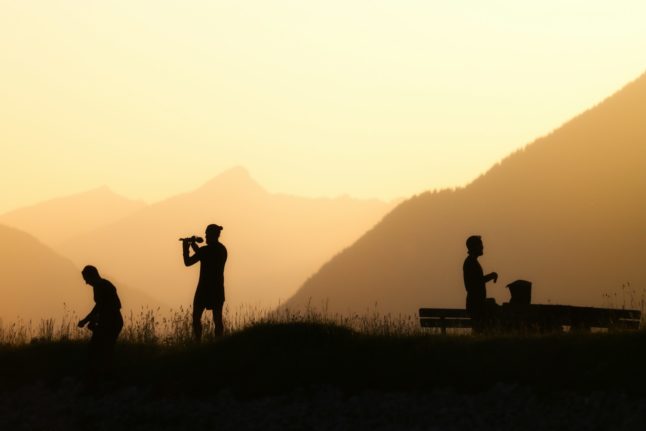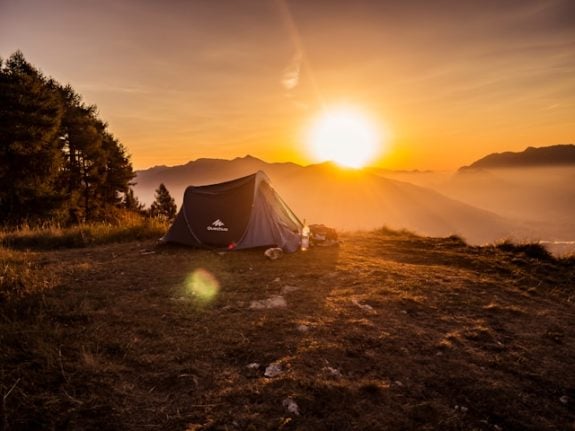Here are ten of the most spectacular, historic, unique or just plain weird places to stay on an Austrian getaway.
Steirisch Ursprung Erlebnishotel – Relive the good old days
Eggersdorf by Graz, Styria
Let’s start our list by taking one giant step back… in time. The Erlebnishotel’ Steirisch Ursprung‘ (Styrian Origin Experience Hotel) has been designed to celebrate Styrian culture, folk art and cuisine of the 19th century, with rooms themed those of a typical farmer, as well as a wedding suite…
…and an ‘erotic room’ full of spicy paintings and carvings for those seeking a romantic getaway.
If you fancy a drop, you’re lucky – the hotel has its own brewery and pub, where you can sample the local beer in two-hundred-year-old surroundings.
Hotel Schafbergspitze – Spectacular views from Austria’s first mountain hotel
St Wolfgang in Salzkammergut, Upper Austria
If you love a good view – and have no fear of heights – the Hotel Schafbergspitze is your destination.
Austria’s first mountain hotel was opened in 1864, with guests travelling to the hotel by a cog railway that climbs around 1190 metres over almost six kilometres.
The hotel features 17 rooms and a restaurant serving hearty local cuisine, which you can walk off exploring the Schafbergspitze’s summit, with stunning vistas in every direction.
Hotel schafbergspitze ,Austria 🇦🇹.
1,780 meters above sea level, this hotel was built in 1862. pic.twitter.com/bzVz4vUy6p— NATURE 🆇❤ (@_NATUREBEAUTY__) September 3, 2023
Dasparkhotel – Stay in a sewage pipe, anyone?
Ottensheim, Upper Austria
You may not want to gaze across the Alps from your double bed. You may want to stay in a sewer pipe instead. Fortunately, Austria’s dasparkhotel covers you, in the charming market town of Ottensheim, near Linz.
Three stylishly appointed cabins have been constructed from repurposed sewer pipe, with comfy bedding, electrical outlets and storage space.
Doesn’t sound very appealing? How about this – staying at dasparkhotel is free, although donations are welcome.
Looking forward to a good night's sleep at dasparkhotel by Andreas Strauss, Ottensheim pic.twitter.com/cg3oJo3CZ0
— Michael Aschauer (@back_face) May 26, 2018
Hotel Schloss Matzen – Live the high life
Reith im Alpbachtal, Tyrol
The hill on which Hotel Schloss Matzen sits has been desirable real estate since Roman times when it was a fort defending trade routes through the region. Since the castle was built in the 12th century, it’s passed through the hands of some of Austria’s oldest and most renowned families – each who left a mark as stewards of the region.
Since 2007, it has been home to a gorgeous luxury hotel, where each room evokes past grandeur within the eight-hundred-year-old structure.
It’s a common location for weddings, with the castle’s beautiful gardens and striking silhouette as a gorgeous backdrop for photos.
Update auf @Burgenwelt zur #Burg bzw. #Schloss Matzen bei Reith im Alpbachtal, #Tirol, #Österreich. https://t.co/jhNcSLmMga pic.twitter.com/P8pzFc7hVn
— Burgenwelt (@Burgenwelt) December 12, 2022
Hotel Burg Bernstein – Red knights, white ladies and stunning vintages
Bernstein, Burgenland
We continue the castle theme with Hotel Burg Bernstein, once a fortress protecting Austria’s eastern borders. Consequently, it has a long and bloody history.
Somewhat unsurprisingly, the castle has a reputation for being haunted by not one but two resident ghosts: ‘Red Ivan’, a furious 13th-century knight who has a habit of appearing to children, and the ‘White Lady of Bernstein’, a veiled figure who may be a 15th-century murder victim.
If that’s not your thing, be of good cheer: The castle also offers wine courses showcasing the region’s vintages.
Historical tours are also available that explore the lives of previous tenants, including Lazlo Almasy – the explorer whose exploits helped inspire the novel and film, ‘The English Patient’.
Mehr Informationen zur Burg Bernstein gibt es auf http://t.co/n27fUJ5OBs pic.twitter.com/v7lSY7LaoO
— Burg Bernstein (@BurgBernstein) September 3, 2015
Hotel Rogner Bad Blumau – Soak in the surroundings
Bad Blumau, Styria
Looking like a technicolour Hobbiton, the Hotel Rogner Bad Blumau was designed by famed Austrian architect Friedensreich Hundertwasser in the nineties to take advantage of the thermal springs discovered on the site twenty years prior.
When you’re done soaking and admiring the lively design of the place and eating extraordinarily well in the restaurant, there’s a ‘geomantic’ path designed by artist Marko Pogacnik to balance your energy levels.
Hotel Therme Rogner pic.twitter.com/RXeLruHPkI
— Rita Cóbix (@RitaCobix) April 4, 2015
Gästehaus Benediktinerstift Göttweig – Simple pleasures in a House of God
Furth bei Göttweig, Lower Austria
You may want to nourish your soul in more holy surroundings.
Gottweig Abbey has been looking over the town of Furth bei Göttweig for over a thousand years.
Reaching a golden age in the 18th century, the abbey is an artistic treasure house, with plenty to explore throughout its buildings and grounds.
As is the trend with many monasteries, Benediktinerstift Gottweig has opened its doors to visitors seeking a little solace, with simple, but comfortable rooms and a restaurant with regional dishes based on local produce.
Benediktinerstift Göttweig
Das Benediktinerstift Göttweig ist ein bekanntes Benediktinerkloster in Niederösterreich, Österreich. Es liegt auf einem Hügel über der Donau, etwa 9 km südwestlich von Krems an der Donau und etwa 70 km westlich von Wien.https://t.co/otKg37KTrx pic.twitter.com/2GCAcvlqmz— CRAZYMEDIA.AT (@crazymedia_at) October 28, 2023
Iglu-Dorf Innsbruck Kühtai
Kühtai, Tyrol
One of four ‘igloo village’ hotels across the DACH region, Iglu-Dorf Kühtai offers several lodgings for couples, families and groups. Cool temperatures and warm blankets make for a great night’s sleep; many of the igloos are far more spacious than you’d think.
Outside the igloos, there’s a bar, winter sports close by and frequent events to keep you entertained during your snowy excursion.
Have you ever slept in an igloo?💙❄️❄️
📍Iglu-Dorf Kühtai bei Innsbruck, Austria 🇦🇹
📸 @esctown#crazywanders to get fe@tur€d
.
.
.
.#visitaustria #austria #österreich #österreich🇦🇹 #reisen #discoveraustria #reisenmachtglücklich #travel #wanderlust #travelgram pic.twitter.com/We2U3kfejC— Crazy Wanders (@CrazyWanders) January 4, 2021
Hotel Sacher – An Austrian Icon
Vienna
You knew we’d need to mention the Hotel Sacher to get through this list.
The Vienna icon first opened its doors in 1876 by restauranteur Eduard Sacher.
While he – and the hotel – are known for the world-famous Sachertorte he created, we can’t forget Anna Sacher, Eduard’s widow, who single-handedly transformed the hotel with her iron will and charisma into the Vienna stalwart it is today.
Today, run by the equally impressive Gürtler family, it’s Vienna’s only privately-owned luxury hotel. While the restaurant is a giant tourist magnet, the luxurious rooms with their belle epoque style are a more exclusive highlight.
Christmas in Vienna❤🎅
Hotel Sacher🎄✨ pic.twitter.com/6oY5VCz8JU— Elfie Neuberger (@ElfieNeuberger) December 22, 2022
Honey Farm – Bzz Bzz
Himmelberg, Carinthia
We end with simple pleasures – and a little natural sweetness.
For several years, Arno Kronhofer and his family have opened their farm at Himmelberg in the country’s south to visitors, where guests can watch and experience raising bees, harvesting honey, and enjoy a country vacation!
In tribute, many of the rooms in the renovated barn feature designs inspired by beehives, with wood, linen and honey-coloured accents filling rooms with golden light.
Have any recommendations for unusual or unforgettable hotel stays in Austria? Let us know in the comments!





 Please whitelist us to continue reading.
Please whitelist us to continue reading.
Member comments